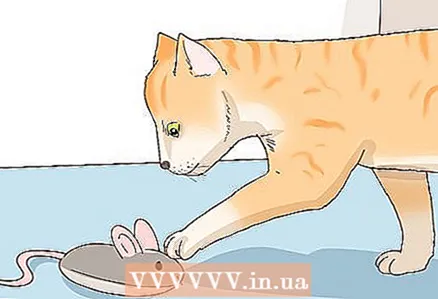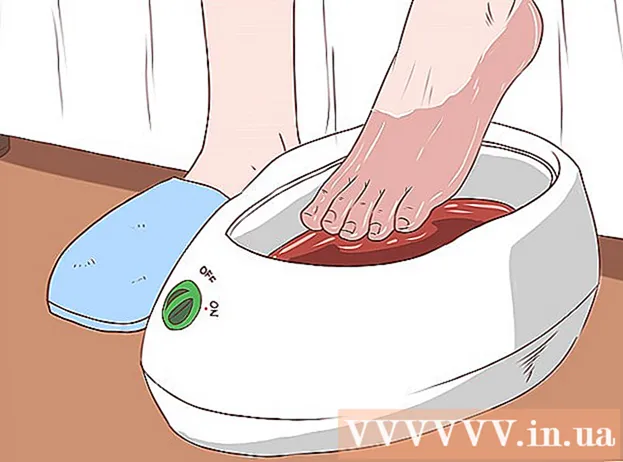Author:
Mark Sanchez
Date Of Creation:
27 January 2021
Update Date:
1 July 2024

Content
- Steps
- Method 1 of 3: Assessing the Situation
- Method 2 of 3: Identifying Signs of Depression
- Method 3 of 3: Dealing with Depression
- Tips
Cats can experience depression just like humans. Their depression can be caused by a variety of reasons, from moving to a new place to losing a loved one. Sometimes depression is difficult to define because the behavior of the animal does not change significantly. However, by closely observing your pet, you can identify depression and take appropriate measures to correct it.
Steps
Method 1 of 3: Assessing the Situation
 1 Show your pet to the vet. If you notice a change in the animal's behavior, make an appointment with your veterinarian. Make sure the depression is not caused by any medical condition that requires appropriate treatment.
1 Show your pet to the vet. If you notice a change in the animal's behavior, make an appointment with your veterinarian. Make sure the depression is not caused by any medical condition that requires appropriate treatment. - Tell your veterinarian about any behavioral patterns you notice, such as changes in appetite, sleep patterns, and habits. Your veterinarian will do a general examination, listen to your heartbeat, check your eyes and ears, and take your temperature.
- Based on your description of changes in the animal's behavior, the veterinarian may order blood tests, x-rays, and other additional tests. Some test results will be ready almost immediately, others will have to wait several days.
- If the veterinarian does not detect any medical conditions in your pet, the cat may be suffering from depression.
 2 Think back to all the changes that have occurred recently. Feline depression can be associated with a variety of life factors. Analyze the current situation and try to remember if there have been important events in recent times that could cause depression in the animal.
2 Think back to all the changes that have occurred recently. Feline depression can be associated with a variety of life factors. Analyze the current situation and try to remember if there have been important events in recent times that could cause depression in the animal. - Have you recently moved to a new location? Change of home is one of the most common causes of feline depression. Many cats react painfully to moving and temporarily fall into depression, which lasts until they get used to their new home.
- Has anyone who lived with you recently died? Whether it was a person or a pet, their death could have a profound effect on your pet. Cats do not perceive and do not perceive death in the same way as we do, but they notice the absence of a person or an animal. This can make them feel depressed.
- Have you become more busy lately? Whether it's due to a busy work schedule, an active social life, or a romantic hobby, spending less time with your cat can become depressed. Cats, especially breeds like Siamese, are social animals and they get depressed if neglected.
 3 Pay attention to the time of year. Seasonal Emotional Disorder (SES) is not limited to humans. Cats are also affected by the time of year and can get depressed during the winter months.
3 Pay attention to the time of year. Seasonal Emotional Disorder (SES) is not limited to humans. Cats are also affected by the time of year and can get depressed during the winter months. - In winter, the days, that is, the daylight hours are shorter, which leads to a lack of sunlight. This can cause depression in cats, manifested in changes in their behavior. If your pet's behavior depends on the time of year, he may be prone to seasonal depression.
- Sunlight affects melatonin and serotonin levels. A deficiency can cause fatigue, anxiety and discouragement in both humans and cats. Cats that spend part of their time outdoors are especially susceptible to winter depression.
Method 2 of 3: Identifying Signs of Depression
 1 Observe your pet's sleep routine. Cats love to sleep. In fact, they sleep on average 16 hours a day. However, if your cat sleeps more than usual, it could be a sign of depression.
1 Observe your pet's sleep routine. Cats love to sleep. In fact, they sleep on average 16 hours a day. However, if your cat sleeps more than usual, it could be a sign of depression. - Because cats often sleep, it can be difficult to tell if an animal is sleeping more. However, you should know when your pet usually wakes up and what time it likes to sleep. Based on this, monitor your animal's sleep patterns.
- If you are used to the fact that the cat wakes up in the morning and comes up to you, and suddenly find that she continues to sleep in a secluded corner in the morning, this could be a sign of depression. If she used to meet you on her return from work, and now continues to sleep on the couch, this should also be considered.
- See if your pet is experiencing loss of energy. Does your cat look lethargic when awake? Some cats are naturally lazy, but if a normally playful and energetic animal lies down for days on end, it could mean depression.
 2 Listen to if the animal has begun to voice more often. Cats make many sounds, from hiss to rumbling and loud meows. If your cat is voicing more often than usual, she may be depressed.
2 Listen to if the animal has begun to voice more often. Cats make many sounds, from hiss to rumbling and loud meows. If your cat is voicing more often than usual, she may be depressed. - When depressed, the cat may scream, howl, and also hiss in response to mild stimuli, or simply make various sounds for no apparent reason throughout the day. Thus, she is trying to inform you that something is wrong.
- As in the case of sleep, different cats behave differently, and changes can best be judged by the owner of the animal, who has studied its habits. If your pet has a tendency to meow loudly to signal its presence or demand attention, you may not need to worry about your cat's increased talkativeness. However, if a normally quiet animal starts waking you up at night with its screams, it may be trying to inform you of its unhappiness.
- Excessive vocalization is often caused by the death of a close friend (pet or human). The cat meows loudly in the hope that the missing friend will hear and return to her.
 3 Observe how your pet eats. When depressed, cats may overeat or, conversely, malnourish. Monitor the amount of food consumed by the animal.
3 Observe how your pet eats. When depressed, cats may overeat or, conversely, malnourish. Monitor the amount of food consumed by the animal. - Typically, in both humans and animals, depression is accompanied by loss of appetite. Your pet may lose interest in food, and you will notice that the cat does not eat at its usual time, and dry or wet food in its bowl remains intact. As a result, the animal can lose weight.
- Conversely, there are cats who, when depressed, begin to eat more food than usual. Although rare, such cats are found. If you notice that your pet is consuming more food than usual, and especially if he is gaining weight as a result, this may indicate depression.
 4 Examine the fur of the animal. In a state of depression, a cat may stop caring for its fur, or, conversely, pay too much attention to it. This can be seen from the condition of the animal's coat.
4 Examine the fur of the animal. In a state of depression, a cat may stop caring for its fur, or, conversely, pay too much attention to it. This can be seen from the condition of the animal's coat. - If your pet has a faded, dull coat, it probably isn't grooming it. You will notice changes in the behavior of the animal.If the cat is constantly brushing its fur after dinner and suddenly stops doing it, it may be depressed.
- Some cats, on the other hand, tend to suppress feelings of anxiety when depressed by brushing their fur too thoroughly. In this case, you will notice that your pet spends too much time licking its fur. As a result, the cat may even develop bald patches and skin rashes.
 5 Pay attention to how often the animal hides. A cat is a social animal, but sometimes she needs to be alone. Cats usually have their favorite places to hide, such as a closet or closet, but staying there too often can be a sign of depression.
5 Pay attention to how often the animal hides. A cat is a social animal, but sometimes she needs to be alone. Cats usually have their favorite places to hide, such as a closet or closet, but staying there too often can be a sign of depression. - When depressed, the animal may hide in a place where it will be difficult to find. For example, instead of hiding in the usual closet, the cat can crawl under the sofa and hide there.
- As in other cases, only you can distinguish between normal and unusual behavior of your pet. Some cats hide more often than others, however, if you are used to the fact that the animal prefers your company, and it begins to disappear constantly from sight, this could be a sign of depression.
 6 Watch out for possible litter box problems. They are indicative of the stress experienced by the depressed animal.
6 Watch out for possible litter box problems. They are indicative of the stress experienced by the depressed animal. - Distinguish between territory marking and regular urination. If the cat is marking territory, it is usually not associated with depression. In this case, the animal usually urinates on vertical surfaces, after which they emit a strong odor; as a rule, this behavior is typical for males. If your cat is marking a plot, he probably is not feeling depressed, but simply believes that rivals are claiming his territory. However, tensions between pets and cats can cause anxiety, stress, and depression in cats. Try to settle territorial disputes between pets before they negatively affect their mental health.
- If you repeatedly find urine or feces in various places in your home, this is one of the signs of your pet's depression. Cats may not urinate in the litter box because they dislike the litter box size, shape, or appearance, or if the litter box is dirty. If you've washed the litter box thoroughly and your pet continues to pee elsewhere, it may be depressed.
Method 3 of 3: Dealing with Depression
 1 Give your cat enough attention. Depression in cats can occur due to lack of attention. Try to show love and attention to your pet so that he does not feel left out.
1 Give your cat enough attention. Depression in cats can occur due to lack of attention. Try to show love and attention to your pet so that he does not feel left out. - Cats are social animals, however they are quite independent. As a rule, cats themselves let you know that they need attention, so wait for the animal to come to you on its own. If a cat comes close to you and shows a willingness to communicate by rubbing against your legs and poking its muzzle into them, it asks for attention. Of course, sometimes you can't give up everything and take care of your pet, but in this case, at least pet the cat, letting her know that you love her.
- Play with your pet often. Try to play 15-20 minutes daily. Cats love ropes and cuddly animal figures to chase after. However, avoid rude behavior. Some cat owners jokingly fight with their pets, although this can lead to excessive shyness of the animal, or vice versa, provoke aggression on its part.
 2 Try to give your cat something to do while you are away. If you find yourself in a time-consuming job and you believe this is the cause of your pet's depression, try to keep the cat from getting bored while you are away. This can be accomplished in many ways.
2 Try to give your cat something to do while you are away. If you find yourself in a time-consuming job and you believe this is the cause of your pet's depression, try to keep the cat from getting bored while you are away. This can be accomplished in many ways. - When leaving home in the morning, do not cover your windows with curtains, especially if you live in a rural area.Make sure there is a table, chest of drawers, or other object near the window for the cat to sit comfortably on. Cats love to watch what is happening outside the window; this will provide your pet with plenty of sunshine and entertainment during your absence.
- DVDs and other media with films specifically designed for cats are commercially available; leaving home, you can turn on such a movie for your pet. These films feature birds, mice, and other cats. However, be careful: the animal can jump onto the TV, knocking it over. Check to see if the TV is securely standing and will not fall if the cat is curious and touches it.
- There are many toys that you can give your cat while you are away, for example stuffed toys like mice or birds stuffed with catnip. There are also puzzle games in which a toy or food is hidden; in this case, your pet will have to find a way to reach the goal, which will keep him busy during your absence. However, be careful: some toys are not recommended to be given to cats without your supervision (they have a corresponding warning). Choose safe toys.
 3 Try light therapy. If the animal's depression is associated with a change of season (the arrival of winter), phototherapy will help get rid of it.
3 Try light therapy. If the animal's depression is associated with a change of season (the arrival of winter), phototherapy will help get rid of it. - Get an ultraviolet lamp and turn it on for a few hours every day in the presence of your cat. These lamps are used for growing plants in greenhouses and greenhouses.
- Veterinarians recommend Sol Box UV lamps specifically designed for cats. They can be ordered online. These lamps emit bright white light; manufacturers recommend exposing a cat to this light for about half an hour daily in winter.
 4 Give your cat synthetic pheromones. Your veterinarian may recommend specific synthetic pheromones to help your pet relax and lift their spirits.
4 Give your cat synthetic pheromones. Your veterinarian may recommend specific synthetic pheromones to help your pet relax and lift their spirits. - The most popular synthetic pheromones include Feliway spray, available from your veterinarian. Before using it, be sure to read the instructions; if you have any questions, ask your veterinarian.
 5 In extreme cases, resort to medication. If you've tried everything and your veterinarian has confirmed that your cat is depressed, it may be worth giving her medication, although it is difficult and can cause unwanted side effects.
5 In extreme cases, resort to medication. If you've tried everything and your veterinarian has confirmed that your cat is depressed, it may be worth giving her medication, although it is difficult and can cause unwanted side effects. - There are four types of drugs used to treat depression and other psychological disorders in cats - benzodiazepines, tricyclic antidepressants, monoamine oxidase inhibitors, and selective serotonin reuptake inhibitors. If your cat is depressed, your veterinarian will most likely recommend a drug of the latter two types.
- Different drugs have different side effects. Some of them can be quite serious. Read the side effects carefully before giving your pet any medication. Check with your veterinarian about the potential hazards and how to overcome them.
- It is very difficult to get cats to take medication. Therefore, most veterinarians only prescribe them as a last resort. If your veterinarian has prescribed medications for your cat, ask them about the route of administration, dosage, and storage method. If you have any questions or concerns, be sure to contact your veterinarian for advice.
Tips
- If you notice a change in your cat's behavior, be sure to consult your veterinarian. It can be not only depression, since other diseases have similar symptoms (especially decreased appetite). It is important to identify a possible illness as early as possible.
- If you think your cat is feeling lonely after losing another pet, get another cat or dog.Of course, this is not an easy decision, but perhaps by doing so you will brighten up your pet's life. If your cat is sociable, get her a friend.



